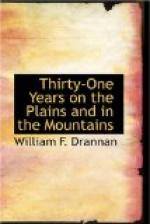He said that every Indian that came out of the cave single-handed or otherwise would not live to get through the picket line, saying that he had a double picket line now around the entire cave, both day and night.
The next morning after this conversation with the General, one of my scouts came in from Rattlesnake Point and reported having seen the tracks of twenty Indians, where they had crossed the road on the east side of the lake, and they were all small tracks.
I reported this to the General, telling him that Jack was a pretty smart Indian, for he was sending his women and children away so as to make his provisions last as long as possible.
George Jones and I started out, accompanied by two platoons of soldiers, to capture the Indians. We had no trouble in finding their trail, and in running them down.
It so happened that our escort that day were all Gen. Ross’ men and were all friends to young Savage, who had recently been killed by the Modocs. After following the trail about ten miles we came in sight of the Indians on Lost river. We did not see them until we were near them and had no trouble in capturing the whole outfit. There were twenty-two, all squaws and little girls. I was personally acquainted with all of those Indians, and knowing so well the cause of all this trouble, and just what brought it about, I could not help sympathizing with the women and children. In fact, I had felt from the very start that this trouble was all uncalled for. Among the crowd was one young squaw who spoke pretty fair English for an Indian in those days. I was well acquainted with her, and told her that we would have to take them all, but that they would be treated as prisoners. She did not seem to understand the meaning of “prisoners.”
I explained to her, and she in her own tongue explained it to the rest of the crowd. I told her that we would have to take them back to headquarters.
She said: “We heap hungry, long time no eat much. Maby white man no give us anything to eat. ’Spose no eat purty soon all die.” I assured her that they would have plenty to eat as long as they behaved themselves and gave the soldiers no trouble.
They all seemed to be perfectly willing to surrender and go back to headquarters, so we started back via Tule Lake. When we reached the mouth of Lost river I turned the prisoners over to the two sergeants who had charge of the two platoons of soldiers. George and I wanted to make a circuit around in the direction of Clear Lake, thinking, of course, that the prisoners would be perfectly safe in charge of the soldiers, especially those little girls. George and I did not get to headquarters that night until ten o’clock, and the first thing I heard when I got into camp was that the Indians had tried to run off into the tules while coming down Tule Lake, and they had all been shot down by the soldiers, I went at once to see Gen. Ross relative to the matter,




